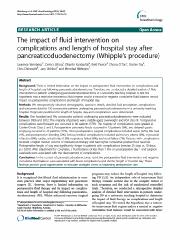Please use this identifier to cite or link to this item:
https://ahro.austin.org.au/austinjspui/handle/1/12218| Title: | The impact of fluid intervention on complications and length of hospital stay after pancreaticoduodenectomy (Whipple's procedure). | Austin Authors: | Weinberg, Laurence ;Wong, Derrick;Karalapillai, Dharshi ;Pearce, Brett ;Tan, Chong O ;Tay, Stanley;Christophi, Christopher ;McNicol, Larry;Nikfarjam, Mehrdad | Affiliation: | Department of Anesthesia, Department of Surgery, University of Melbourne, Austin Hospital, Heidelberg, Australia Department of Anesthesia, Austin Hospital, Heidelberg, Australia Department of Anesthesia & Intensive Care Medicine, Austin Hospital, Heidelberg, Australia Department of Surgery, University of Melbourne, Heidelberg, Australia University of Melbourne, Austin Hospital, Heidelberg, Australia Department of Anesthesia, Austin Hospital, Melbourne, Australia Department of Anesthesia, Royal Darwin Hospital, Darwin, Australia |
Issue Date: | 14-May-2014 | Publication information: | Bmc Anesthesiology 2014; 14(): 35 | Abstract: | There is limited information on the impact on perioperative fluid intervention on complications and length of hospital stay following pancreaticoduodenectomy. Therefore, we conducted a detailed analysis of fluid intervention in patients undergoing pancreaticoduodenectomy at a university teaching hospital to test the hypothesis that a restrictive intravenous fluid regime and/or a neutral or negative cumulative fluid balance, would impact on perioperative complications and length of hospital stay.We retrospectively obtained demographic, operative details, detailed fluid prescription, complications and outcomes data for 150 consecutive patients undergoing pancreaticoduodenectomy in a university teaching hospital. Prognostic predictors for length of hospital stay and complications were determined.One hundred and fifty consecutive patients undergoing pancreaticoduodenectomy were evaluated between 2006 and 2012. The majority of patients were, middle-aged, overweight and ASA class III. Postoperative complications were frequent and occurred in 86 patients (57%). The majority of complications were graded as Clavien-Dindo Class 2 and 3. Postoperative pancreatic fistula occurred in 13 patients (9%), and delayed gastric emptying occurred in 25 patients (17%). Other postoperative surgical complications included sepsis (22%), bile leak (4%), and postoperative bleeding (2%). Serious medical complications included pulmonary edema (6%), myocardial infarction (8%), cardiac arrhythmias (13%), respiratory failure (8%), and renal failure (7%). Patients with complications received a higher median volume of intravenous therapy and had higher cumulative positive fluid balances. Postoperative length of stay was significantly longer in patients with complications (median 25 days vs. 10 days; p < 0.001). After adjustment for covariates, a fluid balance of less than 1 litre on postoperative day 1 and surgeon caseloads were associated with the development of complications.In the context of pancreaticoduodenectomy, restrictive perioperative fluid intervention and negative cumulative fluid balance were associated with fewer complications and shorter length of hospital stay. These findings provide good opportunities to evaluate strategies aimed at improving perioperative care. | Gov't Doc #: | 24839398 | URI: | https://ahro.austin.org.au/austinjspui/handle/1/12218 | DOI: | 10.1186/1471-2253-14-35 | Journal: | BMC anesthesiology | URL: | https://pubmed.ncbi.nlm.nih.gov/24839398 | Type: | Journal Article |
| Appears in Collections: | Journal articles |
Files in This Item:
| File | Description | Size | Format | |
|---|---|---|---|---|
| 24839398.pdf | 195.21 kB | Adobe PDF |  View/Open |
Page view(s)
128
checked on Apr 30, 2025
Download(s)
136
checked on Apr 30, 2025
Google ScholarTM
Check
Items in AHRO are protected by copyright, with all rights reserved, unless otherwise indicated.
